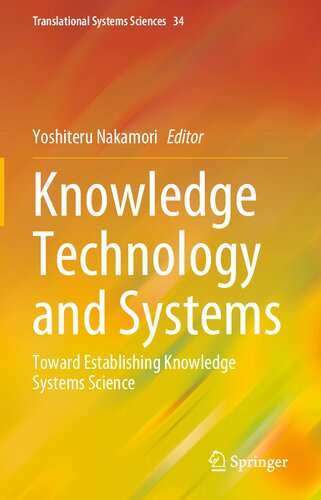

Most ebook files are in PDF format, so you can easily read them using various software such as Foxit Reader or directly on the Google Chrome browser.
Some ebook files are released by publishers in other formats such as .awz, .mobi, .epub, .fb2, etc. You may need to install specific software to read these formats on mobile/PC, such as Calibre.
Please read the tutorial at this link: https://ebookbell.com/faq
We offer FREE conversion to the popular formats you request; however, this may take some time. Therefore, right after payment, please email us, and we will try to provide the service as quickly as possible.
For some exceptional file formats or broken links (if any), please refrain from opening any disputes. Instead, email us first, and we will try to assist within a maximum of 6 hours.
EbookBell Team

4.3
88 reviewsThis book discusses technology and systems to create valuable ideas from data through the construction of knowledge. The primary concern is to make better decisions about economic and management issues in today’s information-flooded society. Human creative activity is in the realm of soft technology, with no physical entity to operate. Focusing on the ability of knowledge as judgment power, this definition results: “Knowledge technology is soft technology that underpins the human creative activities of converting data and information into knowledge, creating new ideas based on that knowledge and validating those ideas.” That definition includes a wide range of soft technologies developed in informatics, management studies, and systems science.
The knowledge system creates ideas from data and knowledge through knowledge technologies. Based on the proposition that knowledge emerges by the interaction between explicit and tacit knowledge, another definition is possible: “The knowledge system is a system that promotes interaction between codified and personalized knowledge and creates ideas for solving a specific problem.” Codified knowledge includes data and information, while personalized knowledge is empirical knowledge or wisdom that is difficult to put into words.
Building a knowledge system requires mathematical or intelligent knowledge technology and participatory knowledge technology to create or manage codified knowledge and personalized knowledge. For example, a company builds cross-sectional knowledge systems by gathering human resources from various departments, according to the purpose, as in new product development or sales promotion. Chapter 1 defines knowledge technology and the knowledge system and organizes the challenges in their development, while Chapters 2 through 9 introduce mathematical or intelligent knowledge technologies by researchers at the forefront of knowledge technology development.